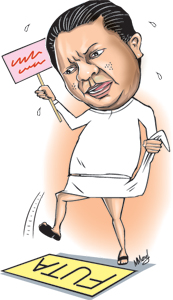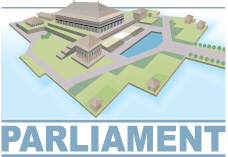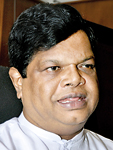August 27, 2012, 7:37 pm , The Island
Now that members of the Federation of University Teachers’ Associations are on strike and unable to mark answer scripts, I am sure that our all knowing politicians will be able to do it.
Mahinda

| At last a civilized debate on free education (at least, until SB opens his mouth)
By Namini Wijedasa, Lakbima News
Like any other trade union action, the strike by university lecturers will have to end in the coming weeks. It is only a question of time, and of an appropriate exit strategy. Several ministers have already indicated that a draft agreement is ready for signing between the Federation of University Teachers’ Associations (FUTA) and the state. It is expected to define the government’s commitments in response to the many demands put forward by FUTA. “It has been finalized,” said Economic Development minister Basil Rajapaksa, who is leading negotiations with FUTA after their talks with Higher Education minister S.B. Dissanayake broke down. Relations between the academics and Dissanayake are acrimonious. “The Higher Education and Education ministers have approved the draft that we agreed on,”  Rajapaksa said. “Now we need approval from other quarters, including from Treasury secretary P.B. Jayasundere. This strike will definitely be settled.” ‘Not just a university issue’ Despite this assurance – which will be welcomed by students whose lectures, exam dates and graduation dates have been badly affected – a large number of trade unions joined up on Thursday for a rally supporting higher government investment in the education sector. Marching in procession to Hyde Park were members of clergy, university lecturers from around the country, industrial workers, school teachers and principals, non academic university staff, medical workers, journalists, free trade zone employees, lawyers, women’s groups, posts, telecommunication and railway workers, food, beverages and tobacco industries staff, electricity workers, transport service workers, some state sector employees and unemployed graduates. The procession and ensuing public meeting were peaceful. Although some attendees claimed to have seen a contingent of riot police around Hyde Park, they were not in evidence when this reporter attended the rally. There was no water cannon, no military, and police presence was minimal. Mahim Mendis, FUTA spokesman, said they had advised students to keep away from the march. “We did not want them to participate in the procession because any provocative action by the government would have led to a massive crisis,” he said. Mendis said students were furious the universities were indefinitely shut down by the minister last week. However, students are also divided over the academics’ strike which has been going on for nearly two months. Hyde Park was not brimming over with people but it was clear that FUTA had put on a respectable show. Many lecturers wore orange or black t-shirts with the words ‘6% Save Education’ and ‘6% GDP for Education.’ On the stage, speaker after speaker stressed on the importance of saving, enhancing and protecting free education which everyone agreed was in deep crisis. There was little or no party politics although the government was criticized over wastage and corruption. Ven. Maduluwawe Sobitha Thera was among several Buddhist prelates at the rally. The influential and widely respected prelate who heads the National Movement for Social Justice urged all members of the public to join their campaign. This was not just a “university issue,” he said. It was a fight to safeguard free education. The rain pelted down as he spoke; an aide held up an umbrella. All around them, people got drenched. Many huddled futilely under umbrellas, sometimes three persons to each. But they did not leave. And once the rain stopped, proceedings went on smoothly as before. ‘Don't mess’ An old couple in a blue three-wheeler attracted a lot of attention. They had hung a placard on the side of the vehicle that read: “Don’t mess with our granddaughter’s right to free education.” The woman said she was 80 while her husband was “83, not out.” She had been a nurse for 34 years while his background was in banking. Neither of them wanted to be named. “Poor people have lot of difficulties educating their children,” the woman explained. “I saw in the papers that when the president goes abroad he takes 58 people with him. Where do they find the money for that? That money should go to education. Can’t they give up some of their spending to buy books for children?” Mendis said the government has committed in principle to spend 6% of GDP on education, something that evolved into one of FUTA’s main demands. “But we want a very clear commitment in writing about how they will do this in this year’s budget, in next year’s budget and thereafter,” he stressed. “The government is notorious for making unfulfilled promises to students.” Regardless of how the FUTA strike ends, there is no argument that it has spurned a lively debate about the future of free education in Sri Lanka. And the subject is being examined for the most part (at least when Minister Dissanayake does not open his mouth) in a civilized and productive manner. |



Higher Education Minister S.B. Dissanayaka
|

Education Minister Bandula Gunawardena
|
 The
members of the Federation of University Teachers’ Association (FUTA)
appeal to the people to express solidarity with their national level
trade union struggle demanding for 6% of the GDP on education since we
need to protect state education and also collectively provide vital
checks and balances to the process of governance in Sri Lanka. Academics
need to ensure that public policy formulation in all sectors, not just
education, will be influenced by them with their strong academic
credentials. Also academics together with the clergy and other civil and
political society leaders have a strong mandate to enlighten the people
on all matters.
The
members of the Federation of University Teachers’ Association (FUTA)
appeal to the people to express solidarity with their national level
trade union struggle demanding for 6% of the GDP on education since we
need to protect state education and also collectively provide vital
checks and balances to the process of governance in Sri Lanka. Academics
need to ensure that public policy formulation in all sectors, not just
education, will be influenced by them with their strong academic
credentials. Also academics together with the clergy and other civil and
political society leaders have a strong mandate to enlighten the people
on all matters. Aug 24, Colombo: A group of undergraduates in
Sri Lanka have threatened to take legal action against the striking
university lecturers.
Aug 24, Colombo: A group of undergraduates in
Sri Lanka have threatened to take legal action against the striking
university lecturers.